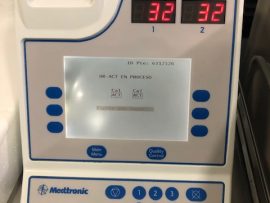Abstract In its ongoing, multidecade quest to optimize patient outcomes in adult and congenital cardiothoracic surgery, The Society of Thoracic Surgeons (STS) has emphasized several key strategies, including quality measurement,..
Read MoreAbstract Introduction: The Activated Clotting Time (ACT) is commonly used to manage anticoagulation during cardiac surgery. The aim of this study was to compare the older manually operated Hemochron® Response and..
Read MoreAbstract Objectives To explore the preoperative, intraoperative, and postoperative dynamics of heparin-binding protein (HBP) in cardiothoracic surgery. Design This was a prospective, observational study. Setting The study was conducted at..
Read MoreAbstract The operating room in a cardiothoracic surgical case is a complex environment, with multiple handoffs often required by staffing changes, and can be variable from program to program. This..
Read MoreAbstract Since 2013, rotational thromboelastometry has been available in our hospital to assess coagulopathy. The aim of the study was to retrospectively evaluate the effect of thromboelastometry testing in cardiac..
Read MoreAbstract Introduction Coronavirus disease 2019 (COVID‐19) is a contagious disease that is caused by the severe acute respiratory syndrome coronavirus 2 (SARS‐CoV‐2). Health care workers are at risk of infection..
Read More





